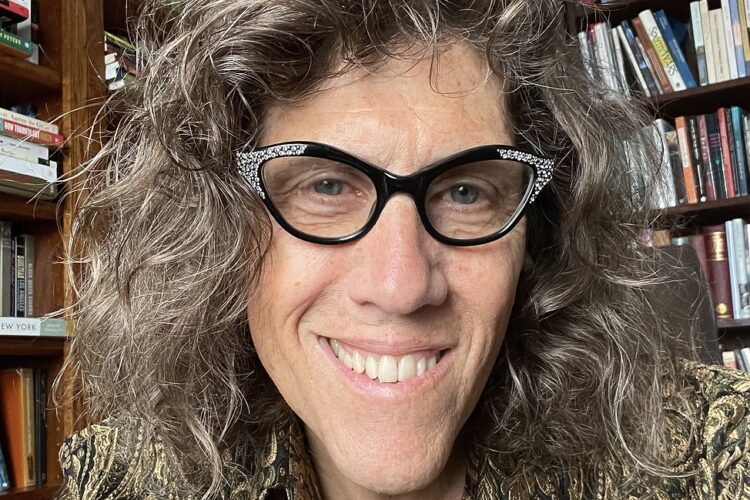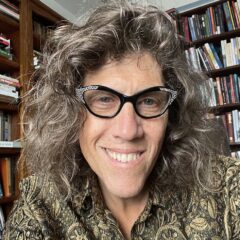In recent years, reactionary political forces in the United States have been stealing pages from the playbooks of authoritarian ethnonationalist populist movements in other parts of the world, and adapting them for use in the US. Far-right evangelical crusader Christopher Rufo, for example, sat at the feet of Viktor Orban in Hungary to learn firsthand from the Hungarian experience how to dismantle the academic study of gender. That’s what Orban did when he banned the subject from being taught at the university level, and forced the evacuation of the George Soros-funded Open University from Budapest to Vienna. Now Rufo is applying those lessons at home. Florida Governor and failed presidential candidate Ron DeSantis recently appointed Rufo to the Board of Trustees at New College, a small public liberal arts college in Florida that had a reputation as a progressive place to study. Rufo’s been gut-renovating the place to transform it into a simulacrum of the rightwing Hillsdale College in Michigan, where he is affiliated as a distinguished faculty fellow. Near the top of Rufo’s agenda at New College was disbanding the gender studies program. He and his cronies see what they are doing there as a proof of concept project for what they’d like to do to higher education nationally if the Republicans capture the federal government again in the 2024 elections.
But the influence certainly flows both ways. US-based anti-gender groups such as Alliance Defending Freedom, the Federalist Society, the Cato Institute, and the Heritage Foundation pump millions of dollars into global campaigns—a recent report from the European Parliamentary Forum estimates that US-based funders contribute a bit less than 12% of the more than USD$700M in funds supporting anti-gender causes in the EU. But by far the more significant US global exports are the gender concept itself, as well as the earliest formulations of anti-gender ideology. To a significant degree, conflicts in the transnational arena both for and against gender are couched in terms derived from US and Anglophone contexts, and represent yet another expression of the Global North’s conceptual hegemonies.
What’s needed, ultimately, are different perspectives that honor, reflect, and accommodate the cultures and cosmologies of the Global South and historically colonized peoples everywhere, as well as the modern West’s own premodern past. Our best hopes for a future filled with liberation, freedom and justice for all lie in reimagining and rearticulating the relationships between all the things that the contemporary gender concept touches on: our most intimate sense of self, the biological substance of our bodies, the social categories through which we live our lives, and our deepest beliefs about the ultimate nature of reality. Gender is more the ground we struggle on than it is a side in the fight. What we need, desperately, is a new ground. We need to change gender.
The currently dominant way of thinking about gender is to consider it just another word for sex; or, with a bit more nuance, to consider it the social or psychological expression of one’s reproductive sex. But the entire “sex/gender system,” to use feminist anthropologist Gayle Rubin’s influential formulation, is deeply rooted in the legacies of the hereditary race-based slave system invented by early modern Europeans as part of a global project of colonization. In Europe’s premodern past, as well as in non-European cultures past and present, it has not been an iron-clad rule that body-differences like pigmentation or reproductive capacity are considered unchangeable anchors that permanently bind any and every given body into unalterable and unjustly hierarchized social categories. Different cultures, as well as different times, have had different beliefs about the body’s mutability over the life-course, different practices for assigning people to personhood categories that may or may not have anything to do with biology, as well as multiple and changeable social categories of personhood to assign them to.
“Biological essentialism” is an early modern European invention, not an eternal truth. It’s an ideology—a carceral one, ultimately, that imagines our bodies as inescapable skin-prisons—imposed by conquest, in service to the exploitation of racialized labor and the extraction of value from the land. Actors in the Global South, as well as trans people in the North, have a common cause in resisting all forms of biological essentialism that con us into forgetting that it is we ourselves, in community with others, who have the capacity to collectively define, and redefine, what our bodies mean. We can invent and enact new and better social forms and practices.
There’s a long history behind how gender, a concept that originates in grammar and has to do with the rules for assigning nouns to categories and making them agree with other parts of speech, became associated with this bioessentialist ideology of the body’s meaning within the modern Eurocentric world-system. The version of gender that has more to do with people than words dates back to at least the 1840s, but it doesn’t really take off until the 1950s. That shift happens primarily through the work of medical researcher Dr. John Money, of Johns Hopkins University in the US city of Baltimore, who studied intersex people. It was Money more than anyone else who popularized the distinction between what he called gender identity and gender role from biological sex. That terminology migrated from the clinic to feminist movements between the 1950s and the 1980s, largely because Anglophone feminists found in the sex/gender distinction a potent tool for making a “biology is not destiny” political argument. That’s why gender, as a concept and a term, does indeed provide an important intellectual resource for advancing a liberatory feminist agenda. At the same time, the grounding of the term gender in the English language, combined with US global geopolitics post-WWII, along with the bioessentialism that is a pernicious legacy of hereditary chattel slavery, makes gender a legitimate target for critique.
A truly unfortunate development in the global critique of gender has been the tendency—equally rooted in ignorance, prejudice, sincere belief and cynical manipulation—to cast trans people as both the victims and the vectors of the gender system. Victims, in the sense that trans and gender-questioning people are often positioned as its dupes, as people being taken advantage of by heteropatriarchal medical capitalism, who need to be saved or rescued from making a horrible mistake with their bodies and lives. And vectors, in the sense that trans people are imagined as actively promulgating a gender system that validates and promotes their own mistaken ways of being at the expense of others. By the mid-1990s, a toxic brew of right-wing ethnonationalist populist movements, reactionary religious doctrines, and transphobic varieties of feminism had coalesced into an “anti-gender” ideology that increasingly targeted trans people, seeking to save them from themselves as well as to save others from them. A quarter-century later, this anti-gender ideology animates a broad and well-funded countermovement to the liberatory aspirations of a visionary trans politics of social transformation.
Until quite recently, transphobic feminists were not anti-trans actors who had any real institutional power over trans lives. But they certainly played a crucial role in developing the discourses and tropes that other, more powerful actors embraced and deployed. That history stretches back more than fifty years, to the early 1970s, primarily in the writings of the US feminist religious scholars Mary Daly and Janice Raymond. The conflicts they generated first played out in the lesbian-feminist community in Boston. Gender and anti-gender, in other words, both emerge first in a US context.
Tracing the Catholic roots of Raymond and Daly’s thought helps explain the strange confluence of feminist and anti-feminist constituencies in anti-gender and anti-trans movements. Daly was a formerly devout Catholic who imagined, in the Vatican II period, that Catholicism could move in a feminist direction. Her first book was called, with a nod to Simone de Beauvoir, The Church and the Second Sex. When Daly’s early hopes were dashed, she rejected not only Catholicism, but Christianity, as recounted in her next book, Beyond God the Father. She then went on to embrace a female-centered pagan spirituality, and to develop a feminist metaphysics, as documented in Gyn/Ecology and later works. Raymond was Daly’s student. She had been raised in a large Catholic family and went to college at Salve Regina, a Catholic women’s school in Newport, Rhode Island. She took vows as a nun, but left her order after coming out as a lesbian feminist proponent of abortion in the 1960s. Raymond then went to divinity school at Andover, and eventually wrote her dissertation, later published under the title The Transsexual Empire, in the Theology Department at Boston College, a Jesuit institution, under Daly’s direction. It was in this work, something of an ur-text for feminist transphobia, that Raymond developed a pointed critique of John Money and the gender concept so closely associated with him. It was here, too, that Raymond made the fateful conflation of trans people as victims and vectors of gender, and targeted them as the symptoms of a sick system in need of a cure. “The problem of transsexualism,” she infamously wrote, “would best be solved by morally mandating it out of existence.”
What’s clear, when you dive into Raymond and Daly’s work, is how much it relies on concepts, ideologies, and modes of analysis steeped in Catholic tradition. It’s new wine in old bottles. Most significant is the idea of what Raymond calls an “ethics of integrity,” a belief that the rightness of one’s actions is best measured in relationship to the natural, god(ess)-given organic integrity of the body. That’s the same idea that underpins Catholic anti-feminist arguments against contraception and abortion, based on ideas that the body is designed or intended for certain divinely ordained purposes, and that to interfere with that in any way, by breaking its forms or altering it function, is an affront to the power that has created it. Trans people, in both the feminist and anti-feminist transphobic traditions, are unnatural amalgamations of broken forms that defile and repudiate the very reasons for their body’s existence. What’s striking is the extent to which the anti-feminist religious reactionaries learned their anti-trans talking points from the feminists, mostly through US-based transphobic feminists involved in anti-trafficking activism crossing paths with them in international women’s rights conferences in the 1980s and ‘90s.
A liberatory trans politics, on the other hand, leans joyously into the idea of repairing the brokenness of the world by bringing it together, North and South, East and West, in new ways on different grounds—not by trying to extend into the future a failed past that is just going to get us all killed faster, the harder we try to preserve it. The planet is on fire, in this, the Anthropocene Era. What more hopeful thing could we do than conceive anew Anthropos itself—the figure of the human that governs our time in history—by changing what it means to be human, relating to each other and the Earth and the cosmos that surrounds it in new ways, changing ourselves, in part by changing gender.






